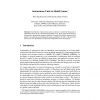1817 search results - page 5 / 364 » Extensive Games as Process Models |
126
click to vote
ATAL
2009
Springer
15 years 10 days ago
2009
Springer
Today's society is largely connected and many real life applications lend themselves to be modeled as multi-agent systems. Although such systems as well as their models are d...
126
click to vote
DIGRA
2005
Springer
15 years 8 months ago
2005
Springer
Academics and industry professionals alike have long been interested in developing a nuanced and empirically sound typography of online gamers. Designers and engineers are aware o...
GI
2009
Springer
15 years 8 days ago
2009
Springer
: Communities of autonomous units are devices to model the interaction of independent processes in a rule-based and graphical way. In this paper, the framework is proposed to descr...
138
click to vote
AAAI
2012
13 years 4 months ago
2012
General Game Playing is the design of AI systems able to understand the rules of new games and to use such descriptions to play those games effectively. Games with imperfect infor...
140
Voted
GECCO
2007
Springer
15 years 8 months ago
2007
Springer
Opponent models are necessary in games where the game state is only partially known to the player, since the player must infer the state of the game based on the opponent’s acti...

